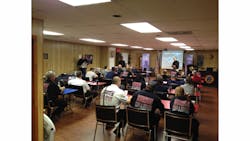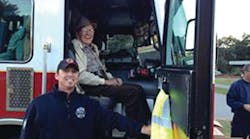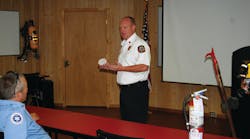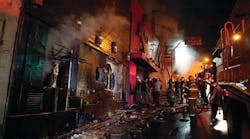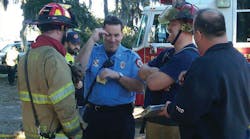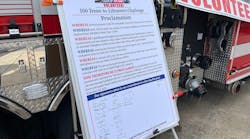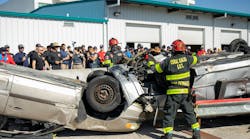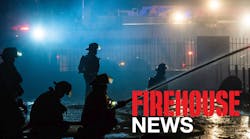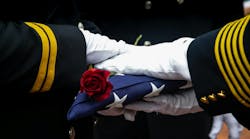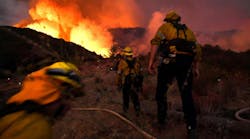A holiday is a certain time of year that cultures memorialize or remember a significant event in their history that allows them to honor and continue their rich traditions, as well as strengthen their purpose and place within the world. The fire service, our culture, has such a time as well and it’s called Fire Prevention Week.
Fire Prevention Week has been around since 1925 and was brought to the national stage for the purpose of bringing awareness of the dangers of fire to a country that had/has a serious fire problem, and to date Fire Prevention Week is the longest running health observance on record. This is a week the fire service is supposed take advantage of in order to educate the public to respect fire, the danger and threat it poses to the community, and thus the important role the fire service has in protecting them from a hazard that has been killing since the days of the Caveman.
By and large it worked. In 1925, when President Calvin Coolidge proclaimed the first National Fire Prevention Week it was noted that more than 15,000 Americans died in fire the year prior. The American Fire Service aggressively pursued the art of fire protection. Next was President Harry Truman’s 1947 fire prevention conference that was mirrored over 20 years later with the “America Burning” report, which gave birth to the National Fire Academy (NFA) and the United States Fire Administration (USFA). The fire service took its purpose and profession seriously. The focus and goal was saving lives and we did. Fires and fire deaths began a steady decline until the late 1990s when terrorism, hazardous materials and technical rescue began to steal our attention; and our society, their values and perceptions, also made a significant change we never adjusted to and still, by and large, approach fire prevention today the same as we did in the 1970s.
Since the mid-1990s, the fire decline we worked for and enjoyed began to plane out and level off. While overall fires still show slight declines – that is not the same happy ending in residential fires, which remain relatively flat. Why? Through building codes and enforcement (aka prevention) the fires occurring in public buildings have pulled those numbers down, but in the residential setting (where there is no enforcement ability to affect this and where only education can make a difference) fires remain a problem.
Somewhere along this line Fire Prevention Week became more about entertainment than education; and our teaching the public to fear and respect fire has been replaced by our glorifying it. The once serious efforts to remind our citizens about the devastation in Chicago and Boston four times, including the Coconut Grove which was repeated again at the Beverly Hills Supper Club and then again at The Station Nightclub; continuous lessons on how quickly and deadly fire can be if not respected and people not properly protected, have given way to just a one-week blitz of plastic fire hats, coloring books, and showing the friction loss of hoselines. These blitzes have become undesired tasks assigned for “others” to do and not part of the mainstream effort of fire protection delivery by the fire service as a whole. Yet we proclaim our job is to protect people from fire.
According to the USFA’s Fire in the United States, 15th edition, 2003-2007, it states that after the publishing of the “America Burning Report” and the focus on prevention, the goal established by the authors of this report to reduce fire deaths by 50% in a generation was achieved. After the report’s publication, national attention was again brought to the hazards of fire and government support for our efforts came full steam by providing the fire service with the resources needed to combat fire from all angles and methods. Not only did the USFA and NFA show up on governmental budget sheets, but firefighters put down the pool sticks and got out of the station and began doing company level fire inspections and education, laws for prevention education in the schools were created or reinforced, and the result was fires and fire deaths again declined. Moral to this story: when funding, support, and focus are brought to bear, the fire service can reach its goals, and most importantly – prevention works!
According to the USFA, the United States has a fire death rate twice that of European nations, and out of 25 industrialized nations the U.S. has sat at number five for the last 27 years. Think about that. The American Fire Service, whose mission is to protect lives and property, who boasts as having a progressive and aggressive fire service among the best in the world; and with all the technology, advancements, education, and knowledge we have of fire, we still are having a problem with man’s oldest tool where other nations have progressed. We look in the mirror and flex, admiring our own greatness based in suppression bravado, while the rest of the world’s fire service utilizes their education and knowledge and pass us by.
This Fire Prevention Week we all need to step away from the mirror and take a very serious look at our service and our approach. Just as some adults attempt to teach our children that Christmas is more than receiving presents, we also need to celebrate this “holiday” by truly remembering what it is about; that while suppression is a very important part of fire service delivery, it is in fact just a part of the total fire protection package. We have all the knowledge, education, and data to support what fire is, how it starts, destroys, and kills, and how to prevent it, but we choose to either do nothing about it, or reduce the seriousness of our business to games, songs, and posters, or leave it up to “others” to do.
Take time this “holiday” to seriously look at our history and where we are now, and work towards putting fire back as a respected threat and the number one risk to our communities, and not something unavoidable “that happens,” and to which we call a “dragon” and eagerly prepared to “slay.” This includes educating our firefighters to honestly respect and fear fire – America’s oldest and unchecked terrorist – and an enemy who can be more devastating and deadly than any hazmat or terrorist incident. Use this time to educate our firefighters on fire protection beyond just the suppression side of our business, but all sides, and based not upon theory, but the data and facts that are available and being successfully utilized by other nations who have reduced their fire deaths and fire problem. This is a week to establish a solid foundation for the services we provide and what we should be about, and not what we think we are about.
There are numerous reports at the USFA and National Fire Protection Association (NFPA) that can quickly and easily be converted to a class for your firefighters; as well as, copious amounts of reports detailing deadly fires not only in the U.S., but around the world. There are global studies on the best prevention practices utilized by other countries that have successfully addressed their fire problem and have surpassed us on the world stage of fire protection.
Before you roll your eyes and begin to dismiss this article, it is also appropriate to end it with another historical statistic; not only has the decline in occurrence of fires and fire deaths planed out since the 1990s, so had the number of firefighter line-of-duty deaths (LODDs), which continued to hover around 100 until recently when we got serious about tackling it, and we put preventing firefighter LODDs as a priority. As previously stated, when funding, support, and focus are brought to bear the fire service can reach its goals. Firefighter LODDs have declined. The moral to that story – prevention works!
Isn’t our public, those we have sworn to protect, just as worthy of those same focused, effective life-saving efforts that we applied to saving ourselves? Or have we really just become that selfish?
DANIEL BYRNE, a Firehouse.com Contributing Editor, is a firefighter/paramedic, with the Burton, SC, Fire District. A 20-year veteran of the emergency services, he holds both an associate and bachelors degree in fire science, is a National Fire Academy Alumni, and a veteran of the Desert Shield/Storm war with the U.S. Marine Corps. Daniel is the recipient of local and state awards for public educations and relations. Daniel is moderator of the Fire Prevention and Life Safety forums on Firehouse. You can reach Daniel by e-mail at [email protected].
